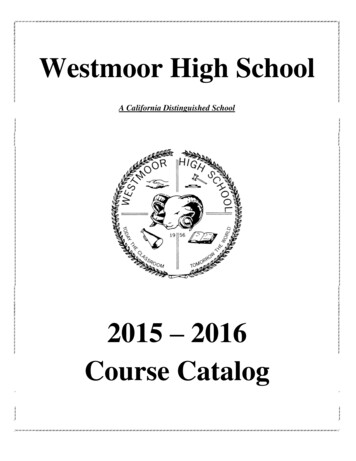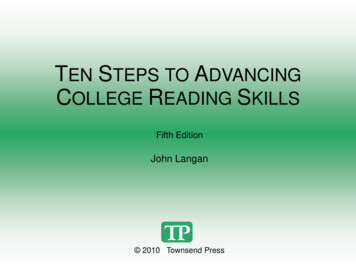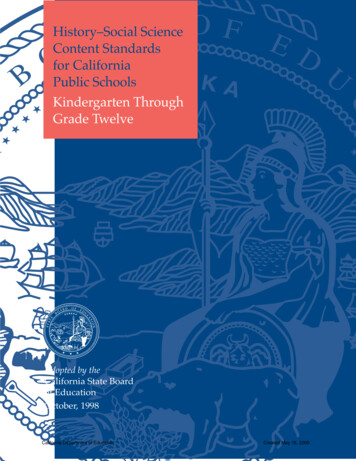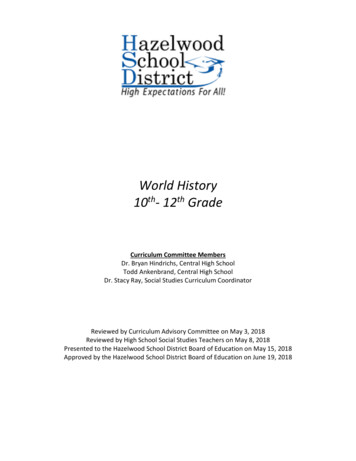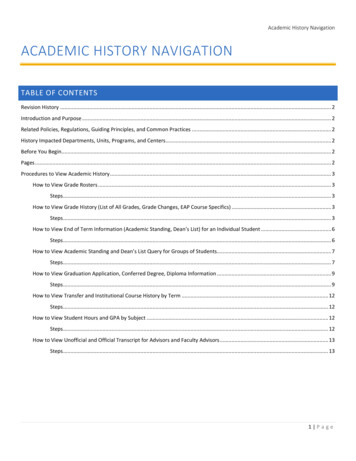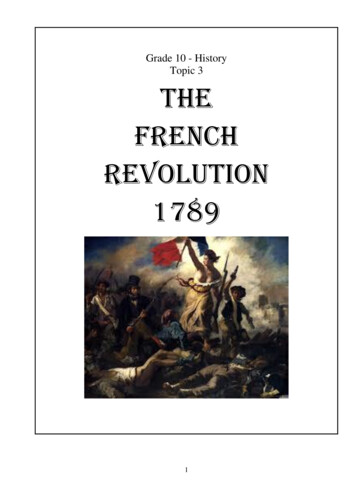
Transcription
Grade 10 - HistoryTopic 3THEFRENCHREVOLUTION17891
Until 1789 rule byKingsStates GeneralsCalled 1789Fall of the Bastille,July 1789King Louis XVI of FranceNew -xvi-9386943]1789 - 1791Republic1792Extremists inPower 1793Reign of Terror1793 - 1794The Directory1795Napoleon apoleon9420291]
CONDITIONS IN FRANCE BEFORE 1789The French Revolution was the result of conditions in France in the century preceding 1789.The causes are usually considered under the following headings:POLITICAL CAUSESA.THE WORKING OF THE GOVERNMENTThe government was despotic, i.e. the King had absolute power. However, there were twoother powerful organisations in France:iiiB.The power of the Churcha.The Catholic Church owned a large amount of land.b.It was very wealthy.c.It was not subjected to ordinary laws; it had its own legal system.d.It did not pay official taxes but gave ‘presents’ to the state on a voluntary basis.e.It was socially and educationally very important.The Parlements of Francea.These were special courts of law that had the right to register alland therefore could refuse to register a law made by the King.b.The King could use his power of ‘Lit de justice’ whereby he could in theoryforce the Parlements to register the law, but in fact he was afraid to use thispower in case he upset the Parlements.b.The King nominated the members of the Royal Council and they were responsible tohim.c.The King and the Royal Council attended to all matters of administration and the resultwas chaos.d.The provinces of France were administered by Royal Intendants appointed by the Kingand therefore responsible to him.e.Although France had a States – General (Parliament) it had not met since 1614 andtherefore the people of the country had no say in how the country was governed.f.Opposition to the King was punished by ‘Lettre de Cachet’ which permittedimprisonment without a trial for an indefinite period. The King also had the right toconfiscate private property.ADMINISTRATION OF JUSTICEa.The King ruled by proclamation.b.There was no uniform system of laws in France. Therefore an offence in one area waspermitted in another area, leading to great confusion.c.The supreme court of justice was the Parlement of Paris whose members were paidmagistrates.3
C.THE CHARACTER OF THE KINGThis system depended on a strong King. Louis XVI was not a strong King. He was wellmeaning but very weak. His greatest fault was his inconsistency which resulted in the fact thathe followed a vacillating policy – he introduced reforms and then withdrew them, he appointedministers and then dismissed them. After the meeting of the States General this policy led tohis downfall.Many historian claims that his wife, Marie Antoinette influenced her husband in such a waythat she was responsible for some of his worst mistakes. The people of France hated her.IISOCIAL CAUSESThe years before the French Revolution were called the time of the Ancien Regime (meaning‘The Old Rule’). The people of France were divided into groups and these groups werecompletely cut off from one another. At the head of the State was the King and under himwere three “Estates” as follows:1.The First Estate of the ClergyThe Upper Clergy, the Bishops, etc were very rich and owned one fifth of all the landin France. They also received money from a tax called the Tithe which was paid onfarm produce and this was between one twelfth and one twentieth of all the foodproduced in France. They also received money on property owned by rich people onwhich a church tax was charged. They themselves did not pay any taxes at all, but theywere expected to make voluntary contributions which of course were usually avoided.At the time of the Revolution, they numbered about 130 000.The Upper Clergy spent much time attending the King. They had no sympathy for thecommon people and many of them did not believe in the religion which they preached.They were even allowed to govern themselves with their own laws and this explainswhy so many people turned against religion during the Revolution.On the other hand, the Lower Clergy such as the parish priests worked hard and werevery poor. For this reason they sympathised with the lower classes. Altogether theClergy constituted about 0.5% of the population.2.The Second Estate of NoblesBefore the Revolution, this Estate numbered about 400 000 or 1.5% of the population.During the Middle Ages, the Nobles carried out duties, some of which were veryimportant and in exchange they had been given privileges, but during the 18th Centurythey had very few duties, but still kept all the privileges. Many of them stayed atVersailles, the Royal Palace, in order to be near the King from whom they askedfavours. The wealthier ones were land lords who owned three tenths of the land ofFrance, but they never went near their tenants who were ruled by managers who wereoften both harsh and dishonest.The Nobles held all the high positions in the government and in the Army and Navy.Sometimes their intellect did not justify this. (This did not apply to the Artillery whereit was essential to have properly trained officers and this is how Napoleon, who was nota Nobleman, managed to become a French Officer). Pay in the Army and Navy wasvery poor and the Nobleman-officer was not allowed to do any other work, so many ofthem were really very short of money. However, they did not have to pay taxes exceptindirect ones which they usually managed to avoid and those of them who owned farmsreceived dues from the tenants (and also had hunting rights over their farms).4
3.THE THIRD ESTATEThis Estate was divided into two groups:iThe Bourgeoisie andiiThe PeasantsiThe Bourgeoisie (3 million)These people formed the middle class. They were mostly business and professionalmen such as lawyers, doctors, merchants, bank managers, etc. They had no sympathyfor the peasants, but they were nevertheless important to them because they were thebest educated people in the country and the only ones who read the books whichattacked the Ancien Regime. (The Nobles did not want to read such books; the Clergywere not allowed to read them and the peasants could not read – they were usuallyilliterate).The Bourgeoisie had many grievances:a.Because they were not privilege, they could not hold high positions in theArmy, Navy or Church.b.Although the business men were often wealthy they had no say in the runningof the country.c.They had no freedom of speech, press or religion and they could be arrestedsimply by the power of a Lettre De Cachet.d.They resented the many restrictions on trade such as the Guilds and theCustom dues.The leaders of the Revolution were drawn from this class largely because they feltthat they should have a proper share in a government, which was denied them.iiThe Peasants (22 million)This was the lower class of the Third Estate. They were nearly all small farmers whohad little or no education and who had to work very hard to make a living.They represented the bulk of the population of France and carried a crushing load oftaxation because although they had the lowest incomes they paid most of the taxes.They possessed one third of the country’s land, but paid 82% of the land’s incometax, e.g.:a.They paid a direct tax to the state (the Taille). This was usually half of theirearnings.b.They also had to pay a salt tax (the Gabelle) i.e. every person over 7 years ofage had to buy 7lbs of salt per annum.c.The peasants paid a Tithe to the Church.d.They paid feudal dues to the Nobles.e.They paid the Banalite for using the landlord’s wine press and mill.f.They were forced to work on the roads for a fortnight every year by a law –called the Corvee.5
In additiong.The peasants were not allowed to hunt or fish even on their own land becausethis privilege belonged to the Nobles alone. They were unable to claim forany damage done to their property and were not allowed to fence their land.h.They could be conscripted into the Army in which they were forced to servesix years, (unless they bought themselves out.)Even so, the French peasants were much better off than the people in Poland andRussia, many of whom were serfs with no rights at all.iiiECONOMIC CAUSESThe Government received the following taxes:1.The Property tax from which the Clergy and Noblemen were exempt.2.The Indirect taxes such as the Gabelle.3.The Customs Duties.But the finances of France were in a bad state for the following reasons:1.EXEMPTIONSThe Nobles were free from the property tax and could usually avoid the other taxes.The Wealthy middle class could buy exemptions, so most of the state taxes fell ontothe poor people who already paid taxes to the Church and the Nobles and who couldnot afford to be taxed anyway.2.THE SYSTEM OF TAX COLLECTIONThe peasants had to pay a crushing burden – over 80% of their income in somecases, yet the state was still not receiving sufficient money. Tax collectionwas carried out by “farmers” for a fixed sum which usually meant that the statereceived only one third of what was paid by the populace. There was no standardsystem of tax collecting.3.TRADE GUILDSThese restricted industry by keeping it in the hands of small groups – much to theannoyance of business men at large.4.THE EXTRAVAGANCE OF PREVIOUS KINGWhen Louis XVI came to the throne, he took over heavy debts because the last twokings had taken part in long and expensive wars. Louis XIV had also spent a hugefortune on building the enormous Palace of Versailles and Louis XV had wasted muchmoney on court favourites.5.THE AMERICAN WAR OF INDEPENDENCEFrance had fought in this war on the side of the colonists and now had a debt of 50 000 000 to pay (R 1 000 000 000).6
6.THE COST OF COLLECTING TAXES WAS HIGH – e.g. one third of Gabellewas spent on troops to prevent salt smuggling.7.During 7 YEARS WARS (1756 – 1763) France lost her colonial Empire in Canadaand India, and therefore income from colonial trade was lost.8.The government borrowed money. Her DEBT was so great that half state income perannum was used to pay the interest on loans.9.In 1788 a FREE TRADE TREATY was signed with England. Cheap English goodswere sold in France. This was a great blow to French Industry and many factories wereforced to close down leading to even greater loss to the French Government.ATTEMPTS TO REFORM THE FINANCES OF FRANCEThe King did make changes to economise but he was weak and did not want to incur the wrath of theChurch and the Nobles. In his attempts to reform, he employed the following:1.TURGOT (1774 – 1776)He was called the Controller-General. He supported the Physiocrats who believed infree trade and the abolition of tolls and Guilds. He was vigorously opposed by theNobles as he attempted to save money by applying stringent economy measures,particularly with regard to court expenditure. He was dismissed at the insistence ofMarie Antoinette.2.NECKER (1776 – 1781)He was called the Director of France and he carried out a strict economy.He published a balance sheet which showed that the American War of Independenceand the greed of the Nobles had destroyed France. For this he too was dismissed on theQueen’s orders.3.CALONNE (1781 – 1788)He tried to re-instate Turgot’s policy by increasing taxation and distributing it moreevenly. But the Nobles were not prepared to make sacrifices and he was dismissed.4.BRIENNE (a few months of 1788)He found that he could do nothing because of the opposition ‘in high places’ and so heresigned.5.NECKER (recalled 1788 – 1789)When he returned he found France to be bankrupt. There was also a food shortage andthousands of people were starving.Necker insisted on summoning the States-General.He hoped that this would bring about a peaceful solution to the problem, but actually itproved to be the starting point of the French Revolution.7
iv.INTELLECTUAL CAUSESa.MONTESQUIEU (1689 – 1755)A student of politics who had a brilliant academic mind.He criticized the French form of government and praised the British constitutionbecause it gave liberty to the individual.He studied the various parts of the government and the functions of these parts, e.g.parliament, kings, judges, etc.His two books, ‘Persian Letters’ and ‘The Spirit of the Law’ played an important part infermenting the revolution, as many revolutionary theories had their origins in its pages.b.VOLTAIRE (1694 – 1779)A brilliant historian, author and dramatist.He attacked the Church because he considered it the enemy of progress andenlightenment. (He remained a Christian.)He was not a democrat.He did not believe in social equality and looked to the autocrats to introduce thenecessary reforms. “I would rather be ruled by one lion than by a hundred rats.”The Church could not forgive him for his criticism and he fled the country to avoidarrest.He lived most of his life in exile or on France’s borders.When he returned to Paris he was hero-worshipped for he had fought injusticeso bravely.c.ROUSSEAU (1712 – 1778)A poet and a musician who preached the equality of man.His greatest political work ‘Du Contrat Social’ sketches his ideas of the basis ofgovernment.He suggested that France rid herself of the monarchy for the King had become a tyrant.He said that the ruler got his power not from God, but from the people.Rousseau was largely responsible for the Spirit of the Revolution.d.DIDEROT AND THE ENCYCLOPAEDISTSThis group led by Diderot did much to spread new ideas. There were 34 volumes in which the progressive ideas of the time were made available to the reading public in acondensed form. Many philosophers contributed articles which criticised theconditions of the Ancien Regime and the power of the Church. Diderot demandedreforms in administration, the system of taxation and the laws.e.QUESNAY AND THE PHYSIOCRATSThis group’s particular field of criticism was the economic situation prevailing underthe Feudal system. They claimed that France’s prosperity lay in the hands of thefarmers who should be freed, especially from oppressive taxation. Furthermore theyadvocated abolishment of Church ownership of land, called for the taxation of the Firstand Second Estates and pressed for free trade (without State interference).8
OTHER FACTORS THAT CONTRIBULTED TO A REVOLUTION1.AMERICAN WAR OF INDEPENDENCEFrance sent an army to help the Americans win their independence. French soldiers returningfrom this war were full of ideas about liberty and democracy. They realised that it waspossible to overthrow an unpopular and oppressive government by revolution.2.FAMINE, COLD AND ECONOMIC DISTRESSThe harvest of 1788 was a failure. Wheat became scarce and expensive. Few peasants couldafford to buy wheat and they starved. This was followed by a bitterly cold winter 1788/89when rivers froze throughout France.Many townsmen were unemployed as a result of the Free Trade Treaty with England. Thenumbers of poor, cold, starving people in Paris grew as country people flocked to the city insearch of food and shelter. They became the Paris ‘mob’ – bored, restless and easily led.A diagram summarizing the causes of the French 9
FAMINE AND COLD SOCIAL1788 harvest failure1788/9 bitterly cold winterTownsmen unemployedPoor cold starving people Paris ‘mob’Feudal system3 EstatesFirst Clergy - privilegesSecond NobilityThird Bourgeoisie - rich wants rightsPeasants – poor attached to landPOLITICAL Absolute monarch(Louis XVI madelaws and passedjudgements)Old Order(Divine right of Kings)Highly centraliseddespotic governmentRuled by royal edictLettre de CachetECONOMIC France bankruptNobility live inluxury (Versailles) Wars Poor system of taxationCAUSES OF THEFRENCHREVOLUTONRELIGIOUS AMERICAN WAR OFINDEPENDENCEChurch riddled withcorruptionChurch participated insuppressing peopleChurch duties neglectedDivision betweenupper & lower clergy Soldiers return fromwar-ideas aboutliberty & democracy Saw possible tooverthrow oppressivegovernmentINTELLECTUAL Ideas l men are equalmust be free andhave Rights within the law10
EVENTS IN FRANCE : 1789MAY 5The States General met at Versailles. Representation was: First Estate 300;Second Estate 300; Third Estate 600. The Third Estate was disappointed to findthat the three Estates were meeting separately. This meant that any reforms suggestedby them could be outvoted 2 – 1.The States General Some texts also refer to it as the Estates GeneralMeeting similar to an SRC meeting at school where issues were addressed and sometimesresolved.Why was the States General called?Necker the director of France at the time had convinced Louis XVI to call the States Generalas he thought it would resolve the peace in France and settle the increasing anger of thepeasants. France was in utter turmoil at this point and the peasants had lost their patience withthe government.What happened during the meeting? Had not met since 1614 First meeting of new century was on 5 May 1789 1201 representatives summoned to the great hall of Versailles and almost double thatin spectators. Representatives were summoned at 8:00 am and the king only arrived at 1:00 pm This annoyed third estate even more as they felt it was a true reflection of the king’sdisregard for his people.--The king gave a speechSwiss banker (in charge of finances) spoke for three hours on thestate of France’s finances a fact already evident to the general public,that France was in major debt and the Ancien’ Regime could not caterfor he needs of the country any longer and a great change was in need.Most of the audience would not have understood the facts and figuresanyway as they were uneducated.Bourgeoisie were annoyed as there was no mention of a change wasmentioned in the day’s proceedings.The resultsThe results of the states general were completely the opposite of what Necker and the kinghad expected. They completely back fired the peasants had lost their patience and it becameone of the short term causes of the French Revolution.Reasons why the States General was not effective1. The representatives did not have freedom of speech and could have been imprisonedfor going against the king and his laws (which were the main issues the public wantedto resolve).2. The representatives were treated like slaves:a. had to enter separately to the nobles and clergy.b. wear black clothing to separate themselves from them.11
JUNE 17The Third Estate met and declared themselves the National Assembly and preparedto act for the nation. They invited the other Estates to join them, a few of the Clergydid so.JUNE 20The Third Estate found that they were locked out of their debating chamber. Theyretired to a nearby tennis court and took an oath that they would not disband until theyhad given France a new constitution. (Laws by which a country is governed.) This wasknown as the Tennis Court Oath.JUNE 23The King held a royal session of all Three Estates and insisted that they should meetseparately. The Third Estate refused to leave the hall.JUNE 27The King gave way and ordered the Clergy and Nobles to join the Third Estate. Theymet two weeks later and declared themselves the National Constituent Assembly. Thiswas a great triumph for the Third Estates. Despite this victory there was a considerableamount of unrest because rumours were circulating that:a.b.JULY 11The King was about to dissolve the Assembly using force.The King was concentrating troops at Versailles.NECKER (Controller-General) who was a popular figure with the people wasdismissed. This suggested that the King was going to take a firmer line. The resultwas unrest in Paris where bread riots took place. The people were encouraged by fieryspeeches to take up arms and defend themselves.Results:a.b.JULY 14A municipal government was set up by the bourgeoisie in Paris to maintainlaw and order.A civic guard known as the National Guard was formed to protect propertyagainst looters.The Paris mob attacked the Bastille, the symbol of despotism, to collect arms. Theybroke into the building and freed all the prisoners. The fall of the Bastille meant theend of Royal Despotism and the transfer of power to the National Assembly.In the Provinces peasant risings occurred. Attacks were made on the castles of theFeudal lords and many of the Nobles fled from France. (known as ‘émigrés’.)OCTOBER 5The hunger march to Versailles by the women took place. They demandedbread. The Royal family had to be protected by Lafayette and the NationalGuard.OCTOBER 6Louis XVI and his family accompanied the mob back to Paris and took upresidence in the Tuileries. The Constituent Assembly followed and thereafterall their meetings were held in Paris. Control of the Revolution fell into thehands of the Radicals in Paris.12
REFORMS BROUGHT ABOUT DURING 1789The Constituent Assembly had several important tasks to performa.To restore peace in the provinces.b.To abolish feudal privileges.c.To give France a new constitution.AUGUST 4A nobleman in the Assembly proposed that peace could only be restored if thenobility renounced their feudal privileges. The nobles in the Assembly did soand it was laid down that:a.There was to be equal taxation.b.There was to be equality before the law.c.There was to be equal opportunity, the sale of government posts wasabolished.d.At the same time decrees were issued which abolished serfdom, thesystem of corvee, all feudal services due to the landlord and all feudalcustoms.The result was that the Ancien Regime ceased to exist.DECLARATION OF THE RIGHTS OF MAN: 26 AUGUST 1789The Assembly had to provide France with a constitution based on the ideas of the writings of thePhilosophers. The influence of Rousseau can be seen in their decisions. They drafted the Declarationof the Rights of Man as a preamble to the constitution. It stated the natural rights of man as well ascondemnations of evils under which the French had lived during the Ancient Regime.NATURAL RIGHTS1.2.3.4.5.6.It stated that “all men are born free and remain free and equal in rights”.All men are entitled to freedom of speech, worship and oppression.No man should be accused, arrested imprisoned except by a legal process – this meant that theLettre de Cachet was invalid.A man was innocent until proved guilty.The use of torture during trials was abolished.Property was declared to be the ‘inviolable and sacred’ right of every man.SOVEREIGNTY OF THE PEOPLEThe declaration stated that France was not the personal property of the King. All the authority of thegovernment came from the people. The declaration stated:“Law is the expression of the general will. All citizens have the right to take part in its formation.”“All sovereignty resides essentially in the Nation.”It also stated that the right of consenting to taxation resided in the people or their representatives.13
Before the end of 1789 changes were made with regard to the Church:NATIONALISATION OF CHURCH LAND: 2 NOVEMBER 17891.The tithe was abolished.2.The wealth of the Church was surrendered to the State and all its land was taken over by theState. The land was sold by public auction.3.The clergy became servants of the State, and had to take an oath of allegiance to the State.Their salaries would be paid by the State and Bishops and Priests would be elected by thecitizens.4.1790: CIVIL CONSTITUTION OF THE CLERGY : Civil Constitution of the Clergy, was anattempt to reorganize the Roman Catholic Church in France on a national basis. It caused aschism within the French Church and made many devout Catholics turn against the n.org/sites/default/files/swf/lapidus/ images/panel3 1.jpg][14
The royal family return to Paris underarmed guard.EVENTS IN FRANCE 1791 – 1796[http://media-cache-ec0.pinimg.com]1791 THE FLIGHT TO VARENNESAlthough Louis XVI had agreed to all the reforms carried out by her Assembly, he was unhappy aboutsome of them, especially the control of the State over the Church. He decided that he wished to leaveFrance to seek foreign aid. Mirabeau tried to dissuade him but after the latter’s death, Louis madeplans for his escape. With his family he left the Tuileries by coach and made his way to the Germanborder. He was recognised by the postmaster of a small village and when the coach reached Varenneson 21 June, Louis was arrested and taken back to Paris where he was virtually a prisoner.The attempted escape had serious results as the French people felt that Louis had betrayed therevolution. Before he left Paris he had written a letter withdrawing his agreement to all the decreesissued by the Assembly. Many people demanded that the King should be deposed and that Franceshould become a republic.1792 THE OUTBREAK OF WARIn September 1791 the National Constituent Assembly completed its work on the Constitution anddissolved itself. It also said that its members could be re-elected. When the new Assembly met inOctober 1791 it was dominated by members of a political club called the Girondins. They believe thatwar against France’s enemies would serve two purposes:1.It would unite the people of France behind their leaders.2.It would show the King up as a traitor and enable them to depose him.The Emperor of Austria and the King of Prussia issued a statement that the fate of the monarchy inFrance was the concern of all European monarchs. (They were afraid that the same sort of troublewould face them in their own countries.)In April 1792, the Girondins persuaded Louis to declare war on Austria. The French army was routedby the Austrians, and the King dismissed some of the Girondin ministers. Control of the Assemblypassed into the hands of another political group called the Jacobins. Danton, one of their leaders, tooksteps to deal with anyone suspected of Royalist sympathies. More than 1 500 people died in what wasknown as the September Massacres.15
THE ABOLITION OF THE MONARCHYThe King was suspected of having betrayed the French army and the crowds invaded the Tuileries andLouis was forced to seek the protection of the Assembly. On 21 September 1792 the Monarchy wasabolished and France declared a republic.In 1792 Louis was put on trial on a number of charges – one on having conspired with foreign powersagainst the new government of France. He was sentenced to death and executed on January 21 1793.The execution of Louis .jpg]1793 THE FORMATION OF THE FIRST COALITION AGAINST FRANCEIn September 1792 the French armies won a decisive victory over the Prussians at Valmy. This wasfollowed by a French invasion of the Austrian Netherlands. This was a threat to Britain who becameless sympathetic towards the revolutionaries in France. The execution of Louis caused greatindignation in Britain and other countries in Europe.In February 1793 France declared war on Britain. Holland and Spain formed an alliance with Britainso now France was at war with Britain, Holland, Spain, and Austria. Prussia and Sardinia. The Frencharmies were soon defeated.1793 – 1794 THE REIGN OF TERRORThe defeat of the French armies led to a state of emergency in Franceand anyone who was not loyal to the republic was dealt with veryharshly. A Revolutionary Tribunal was set up to deal with this.Suspects were tried and executed. France was plunged into any orgyof bloodshed. 3 000 were executed in Paris alone in a few months.16Maximilien de pierre]
Among them were Marie Antoinette and Danton.Robespierre, also a Jacobin took control of the Government and the bloodshed continued until theNational Convention opposed him. He was arrested and executed. The Reign of Terror ended.A new constitution was drafted for France and the government was to be controlled by five Directors.THE REIGN OF TERROR 1793 – 1794REASONS FOR THE TERRORThe Foreign ThreatInflationThe Threat at Home1. The Foreign ThreatBy March 1793 France was at war with most of Europe, and was on the verge of defeat. Thiscaused riots and threatened revolution inside France itself.2. The Threat at HomeThere was still serious opposition to the Jacobins inside France. The Brissotins were the largestpolitical opposition and their support came mostly from the provinces. There was serious riotingboth in the country and the cities until the Jacobins arrested all the leading Brissotin members ofthe government. Instead of quelling the riots, they intensified and France was in turmoil.3. InflationMoney had been overprinted and inflation soared. By February 1793 money was only worth ½ ofthe amount printed on it. Food, and other goods, was in short supply and the people of Paris beganrioting – they raided warehouses and shops and sold the goods off at their own prices.In April 1793 the COMMITTEE OF PUBLIC SAFETY was established to deal with this desperatesituation. The control of this Committee was in the hands of the Jacobins – and the Committeeconsisted of a group of gifted, but ruthless men. The most widely known member wasROBESPIERRE.HOW DID THE COMMITTEE OF PUBLIC SAFETY DEAL WITH THE PROBLEMS?1. The Foreign ThreatThe Committee organized a massive war effort. Everyone had to help, and an army of 850 000was raised. The plan worked and towards the end of 1793 the French Army had a series ofvictories.2. The Threat at HomeThe Committee of Public Safety ordered the ruthless suppression of countrywide revolts. In Lyonsnearly 2 000 rebels were shot and the houses of the rich destroyed. In Nantes mass drownings wereordered, about 1 300 people were drowned. By this time the revolts collapsed, but the Committeewas still afraid of any signs of opposition. Members of Jacobin clubs throughout the countryreported on those whose loyalty they suspected.Until the LAW OF SUSPECTS (September 1793) a person could be arrested for simply lacking17
enthusiasm for the Revolution. The accused were
7 6. THE COST OF COLLECTING TAXES WAS HIGH – e.g. one third of Gabelle was spent on troops to prevent salt smuggling. 7. During 7 YEARS WARS (1756 – 1763) France lost her colonial Empire in Canada and




